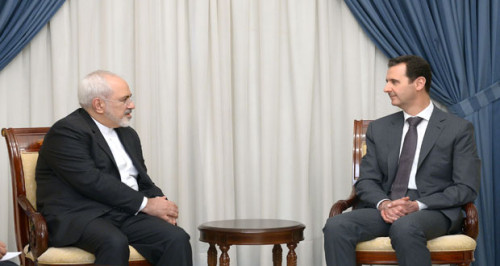PHOTO: Iran’s Foreign Minister Mohammad Javad Zarif with Syrian President Assad on Wednesday
LATEST
Iran tried to regain the diplomatic offensive on the Syrian crisis on Friday, three days after Saudi Arabia publicly rejected a Russian-Iranian initiative for high-level political talks.
Deputy Foreign Minister Hossein Amir Abdollahian said Iran will speak to members of the six-nation Gulf Cooperation Council on the crises in Syria and Yemen, at the request of the Emir of Qatar and the Foreign Minister of Oman. The discussions will begin before the end of September, either “in the region or another country that has been agreed upon”, to “reach a common understanding for…confronting crises present in the region”.
Saudi Arabia is a GCC member, along with Kuwait, Qatar, Oman, the UAE, and Bahrain.
Abdollahian expressed support for Damascus, albeit without giving a personal endorsement to President Assad’s continued hold on power:
An important meeting was held [on Wednesday] between Zarif and Bashar al Assad. The important point is this: Tehran firmly supports the people and government of Syria and the people of Syria will determine the fate of their country through a democratic process.
Since late June, Russia and Iran have tried to arrange high-level talks, including discussions between the Assad regime and Saudi Arabia, a key supporter of Syria’s rebels.
However, on Tuesday Saudi Foreign Minister Adel al-Jubeir said in Moscow, after his meeting with Russian counterpart Sergei Lavrov, that Assad must step down as a precondition for negotiations over a transitional government.
On hearing the news, Iranian Foreign Minister Zarif — in Beirut pursuing the initiative in a meeting with Hezbollah leader Hassan Nasrallah, another essential ally of Assad — postponed his trip to Turkey, another supporter of the Syrian opposition and rebels.
Abdollahian tried to repair some of the damage, saying a “frank and transparent” conversation with Jubeir at a meeting of the Organization of Islamic Countries in July “emphasized the importance of Saudi-Iranian conversations about helping crisis-stricken countries in the region confront terrorism”.
However, the Minister chided Jubeir over the Tuesday statement, saying the call for the removal of Assad was “unrealistic and unconstructive”.
Abdollahian blamed the postponement of Zarif’s scheduled trip to Turkey on “the absence of essential officials in Ankara”, but emphasized that Iran and Turkey share a “strategic relationship”. He said Iran “will continue serious consultations with the government of Turkey on approaches to the region and Syria”.
Head of Guardian Council Jabs at Government Over Process to Approve Nuclear Deal
The head of the Guardian Council, the body ruling on political and legal issues, has jabbed at the Rouhani Government over the process to approve the July 14 nuclear deal with the 5+1 Powers.
Delivering the Tehran Friday Prayer, Ayatollah Jannati, expressed a preference for formal approval of the deal by Parliament.
The Government has argued that, while Parliament can offer its advice, its vote is not binding. Instead, the endorsement is up to the Supreme National Security Council.
Jannati urged the Government “to quickly move to define the precise legal status” of the deal, which puts long-term limits on Iranian uranium enrichment and nuclear programs in return for the lifting of US-led sanctions.
Hardline MPs and clerics have insisted on the Parliamentary vote. The Supreme Leader, who has backed the Government’s handling of the nuclear negotiations, has not expressed an opinion.
Former President Hashemi Rafsanjani, the head of the Expediency Council and an important Government ally, chided the criticsin a meeting with Iranian students:
Some ignorant individuals try to downplay the effort of Iran’s negotiating team; they simply find fault.
As President Rouhani has openly said negotiations are a matter of give and take. If the other side thinks that it will not gain anything in the negotiations, it wouldn’t sit at the negotiating table.

